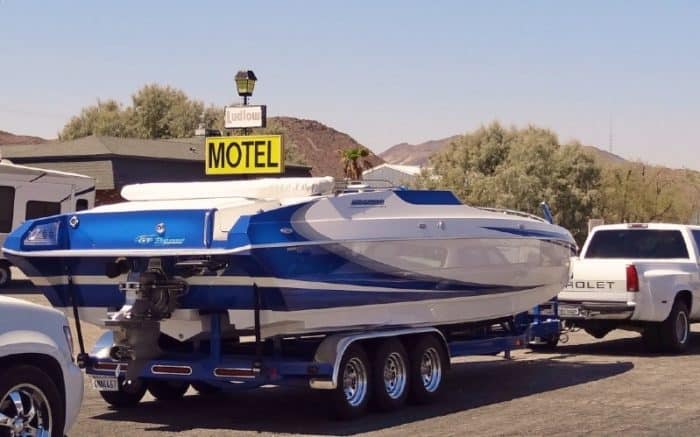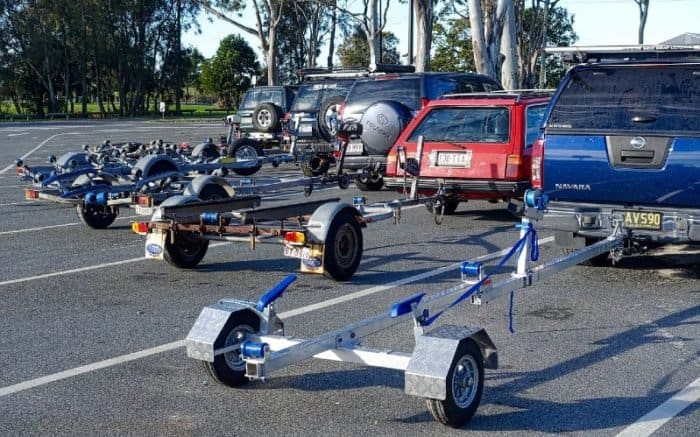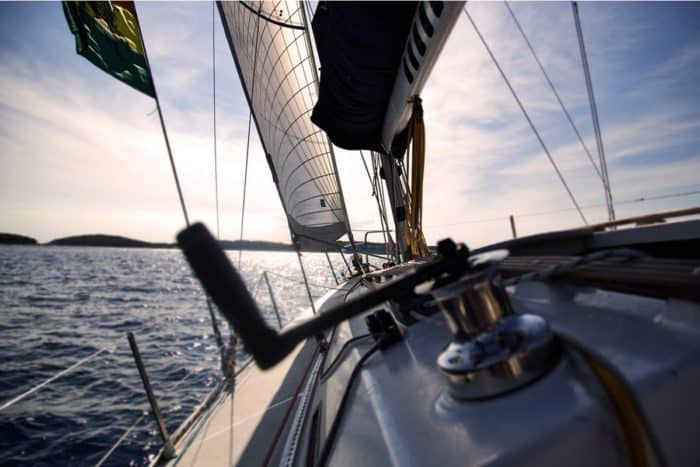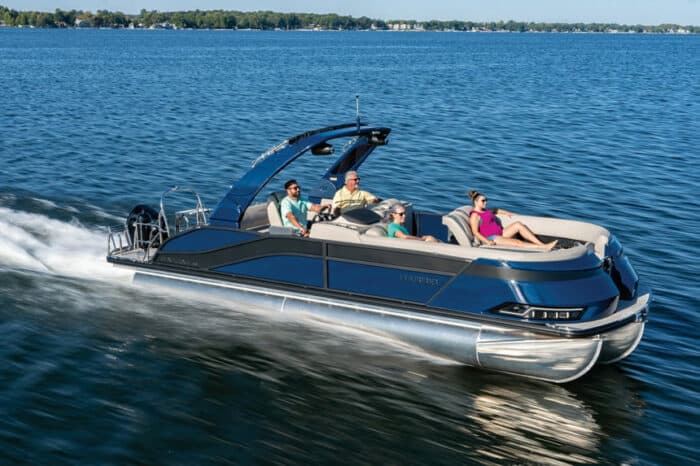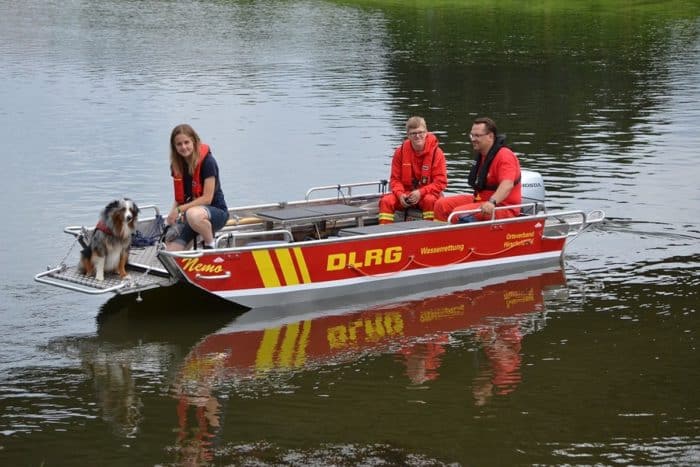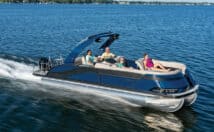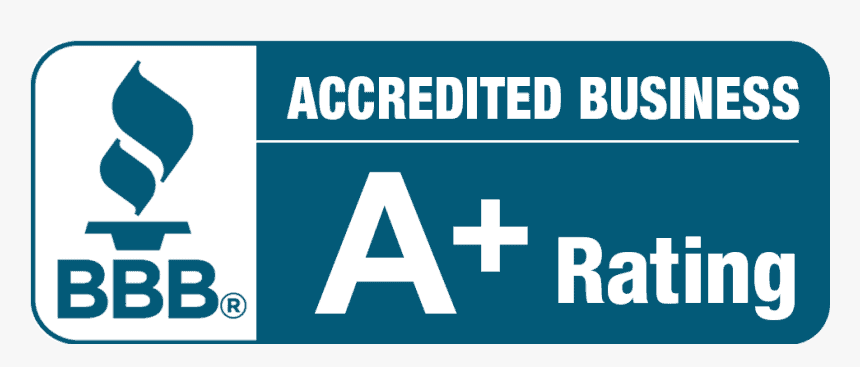9 of the Best Marine Grease Options for 2024
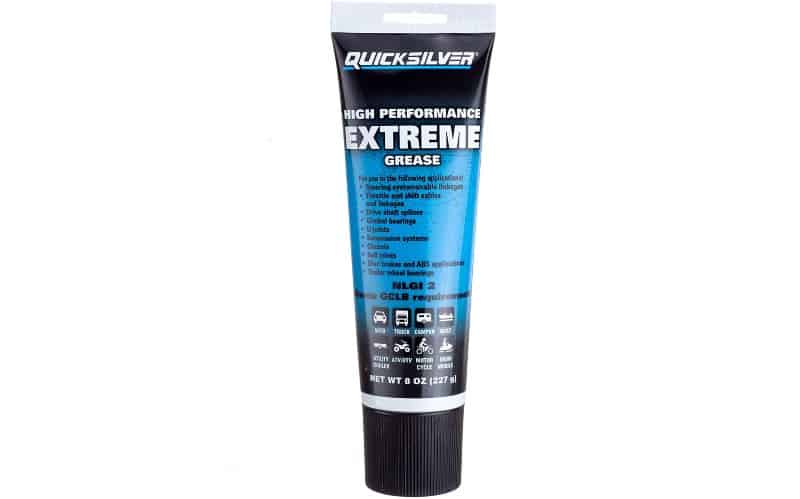
Quicksilver High Performance Extreme Grease
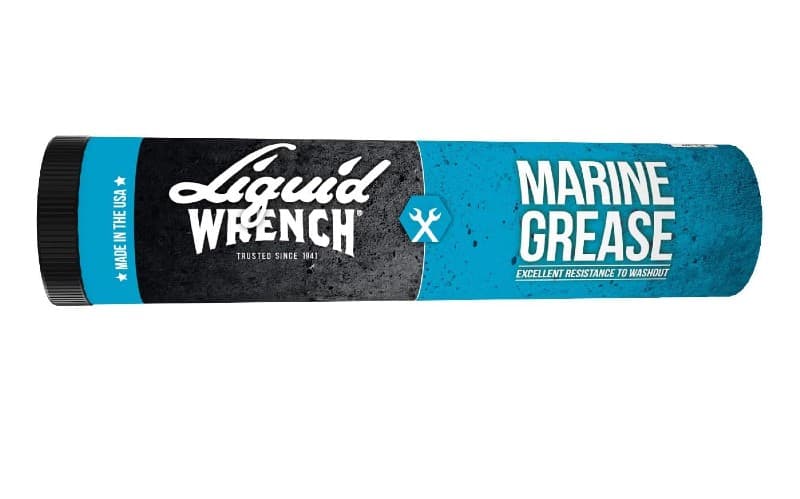
Liquid Wrench Marine Grease
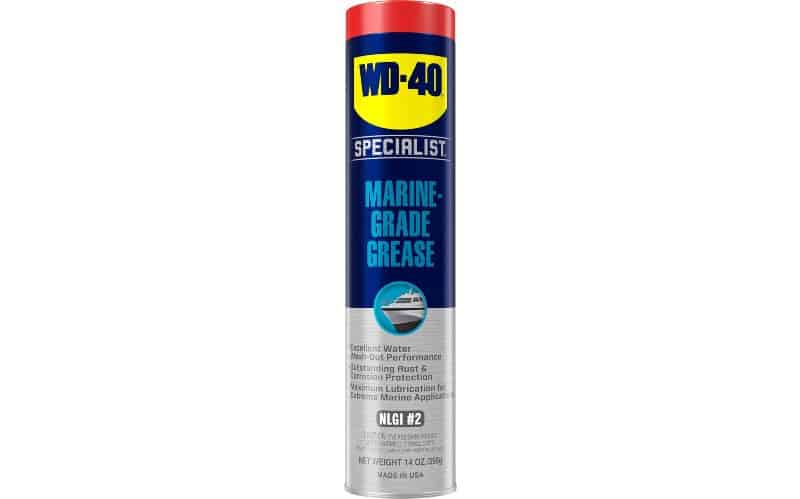
WD 40 Specialist Marine Grade Grease
Marine grease is one of those products you never think about until you need it. But when you do need it, you want to make sure you have the best stuff for the job at hand. You’ll find marine grease most useful for keeping your boat trailer wheel bearings in good working order, but it really does have a ton of other potential uses in and around the boat. You just need to make sure you have the right formula for the right job.
Quicksilver High Performance Extreme Grease

Quicksilver offers up a high performing calcium sulfonate formula here that can handle all the heat your boat and trailer can throw at it. I have to say, for the price, this is probably the best marine grease you’re going to find out there today. It offers great protection against rust and corrosion while also being up to the task of handling friction and water. As an added bonus, it’s compatible with lithium-based greases. That means you don’t need to worry about things grinding to a halt if you end up mixing the two by accident. I still recommend a thorough cleaning of your bearings or any other parts before using this, but that’s the same as any grease product. It’s always good to get old, contaminated stuff out of the way whenever you can.
It comes in 8 ounce tubes so keep that in mind if wheel bearings are your goal here. You’ll likely be needing a few of these to finish every wheel. It can be dispensed right from the tube by hand if you want, or cut the whole tip off and use it in a grease gun.
Liquid Wrench Marine Grease

Liquid Wrench has been a solid name in the automotive market and their general use lubricants are typically pretty reliable. When it comes to marine grease, their formulation gets the job done well at a good price.
This product is calcium sulfonate based which means it’s designed for high temperature applications. That makes it ideal for those wheel bearings as well as anything from hinges to your bilge pump. It offers superior corrosion resistance and can handle both freshwater and saltwater use. The formula is all but impenetrable to water so you’ll definitely get your money’s worth here. At 15 ounces, you get the most bang for your buck here compared to the competition making this the best choice for those looking for a budget option.
WD 40 Specialist Marine Grade Grease

Everyone knows WD-40 but not everyone knows they make marine grade grease. Well, they do and, as you might expect, it’s pretty good. This lithium complex grease is designed for high temperature applications and is highly water resistant. It’s able to stand up to fresh or saltwater with ease and protects against corrosion.
If you’re looking for traditional WD-40 with the little red straw, you won’t find it here. This requires a grease gun to apply properly and you’ll make a heck of a mess if you don’t have one, so keep that in mind.
Plews and Edelmann Lubrimatic Kit
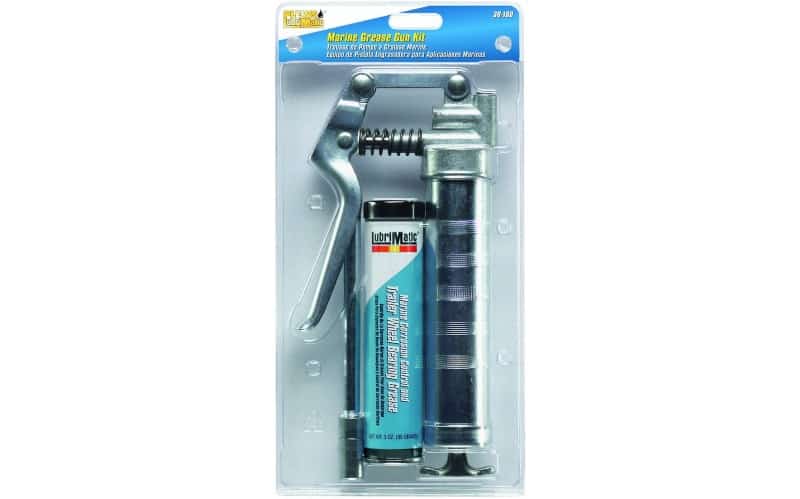
If you’re looking to spend a little more to get a little more, I recommend the Plews and Edelmann lubrimatic kit. This one takes you to the next level by not just offering you the grease you need but an actual grease gun to apply it with. If you don’t have one already, this makes a really handy kit to have. The grease gun is designed for 3 ounce tubes and offers up 4,500 PSI for application.
Keep in mind, this is just a mini grease gun so you’re not going to be opening your own lube shop here. But it will put you ahead of the game when it comes to doing these jobs yourself, especially lubing those wheel bearings on your trailer.
In a pinch, this thing can be a lifesaver and really get things working for you and that’s why it’s recommended here. If you’re more serious about doing this kind of work in the future then you’ll probably want a larger grease gun. That said, when you need to get something greased quickly without a lot of extra effort, this is probably your best option.
Lucas Marine Grease
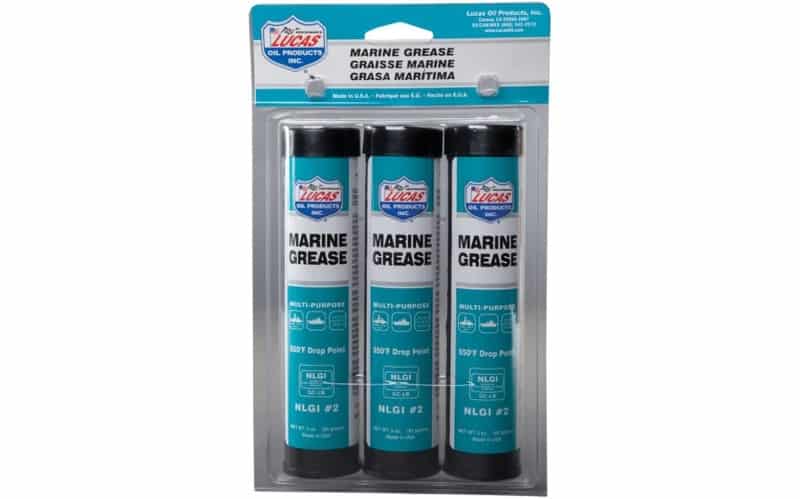
A three-pack of Lucas Marine grease is one of the more affordable options out there and the formulation is pretty good at what it does. This is another calcium sulfonate lubricant so it will offer good protection against rust as well as great temperature resistance. The viscosity is what you’d expect and it can withstand pressure and water exposure well. It’s not going to wash away on you.
That said, there are a couple of things to keep in mind here. For one, even though it’s a three pack which seems great, pay attention to the size. These are only 3 ounce tubes, so if you’re looking for a lot, you’ll be disappointed here. These are definitely for smaller jobs.
Another thing I’ve heard though I haven’t experienced myself is that some users have dealt with air issues in the tubes. Which is to say they have been overfilled with air according to some buyers. That may be a fluke that affected just a few people or a certain production run, it’s hard to say.
Star Brite Trailer Wheel Bearing Marine Grease
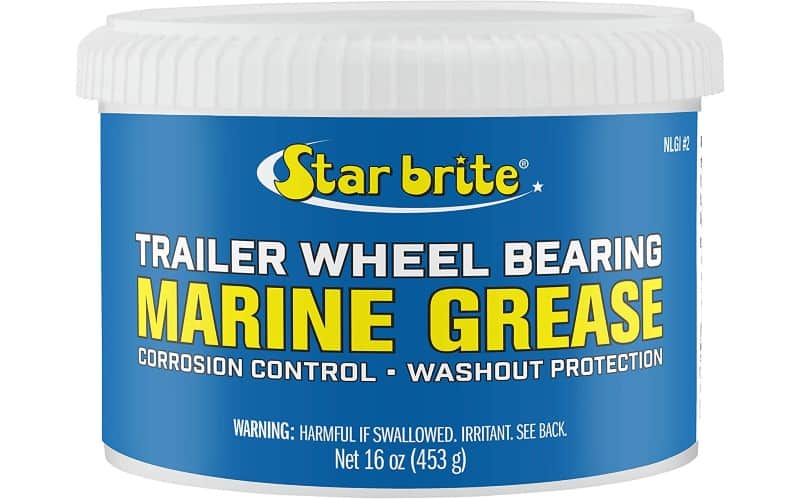
This is a weird one but I’m recommending it anyway. Star Brite makes good, affordable products so I have no complaints about any of the other products of theirs that I’ve used. The only issue I have with this trailer wheel bearing grease is that they don’t tell you what the formulation is. It seems likely it’s a lithium complex given the temperature range it can handle, but they never specify that on the labels or even their website, which is odd. The average person probably doesn’t care so maybe that’s why they don’t mention it, who knows?
Regardless, it’s a solid product and a good price. It’s very thick and water resistant so you don’t need to worry about this stuff washing away. It also works great in winches, reels, really anything you need to keep lubricated and running smoothly.
Yamalube Marine Grease
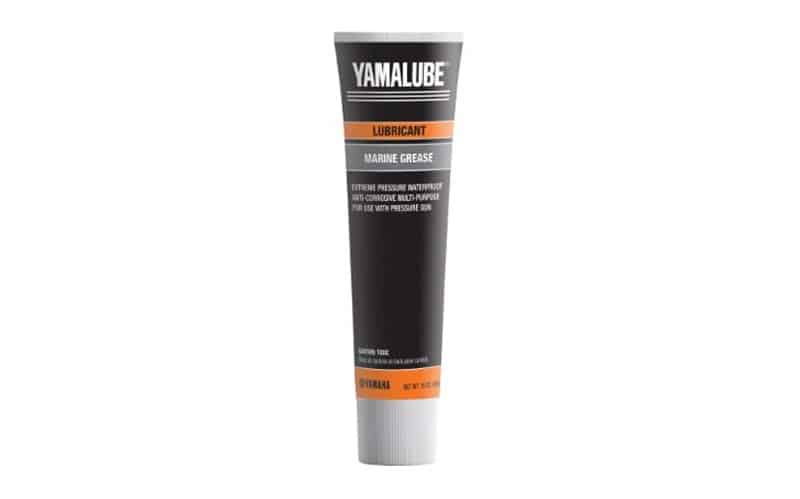
Surely Yamaha knows a thing or two about using marine grease, right? Yamaha boats have been around for years now and the company definitely has some expertise in this area. That’s why their amusingly named Yamalube is on the list.
The formula here is different from most of what you’ll see on the market, it’s a silicone carbide compound. It is incredibly hard to wash this stuff off once it’s in place which is a good thing as it proves its water resistance. Just be careful not to make a mess with it because cleaning up is a chore if it gets where you don’t want it. A grease gun is recommended and absolutely necessary for zerk fittings, but because of the tube it’s sold in you don’t technically need one for all applications. Just make sure you have a steady hand and know what you’re doing.
As a fun aside, if you’re looking to grease your fishing reels, this is one of the best greases out there for that job as well.
Mission Automotive Silicone Paste
This entry comes with a little asterisk. This stuff is great but this is not all purpose marine grease. This is a dielectric grease so you want to use this for anything electrical. But it’s included here because it is a lubricant and it can really make life on your boat a lot easier.
This silicone paste is used to protect electrical connections from exposure to the elements. If you’ve been boating for a while you may have already experienced corroded connections and wires that, over time, build up a patina that lowers performance. Save yourself the hassle of either cleaning or replacing wires and connections and use this stuff. It’s great on solder joints, too.
Even in salt air, this will stop oxidation and ensure that you’re not wasting battery power trying to keep your electrical system working. It’s also great around rubber gaskets and fittings. Just remember, this is by no means the same as a wheel bearing lubricant and you can’t use it for that purpose.
CRC Marine White Lithium Grease
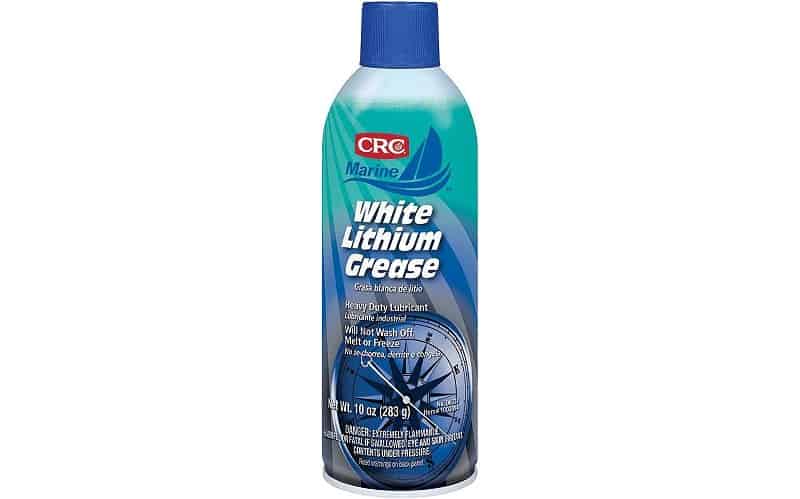
CRC Marine offers something unique with this white lithium grease. Unlike the other tubes and cans, this one is sold as an aerosol. Just spray it on and the job’s done. I recommend this for something like a boat prop, winches, reels and so on rather than anything that’s going to be requiring high heat resistance. Not that white lithium doesn’t offer high heat but the viscosity of this seems to be a little less than you might expect. Just something to keep in mind when deciding how you want to use it. That said, the convenience of the spray can really goes a long way to making it more versatile and useful than a grease gun or a squeeze tube.
Choosing the Right Marine Grease
As with everything, there are plenty of choices on the market when it comes to marine grease. It’s an incredibly useful product that is chiefly used for trailer wheel bearings. That said, wheel bearings are far from the only application.
Applications
Quality marine grease is designed to be totally waterproof, thick enough to maintain hold in watery conditions, and able to maintain integrity even in high heat. Marine grease is thickened which allows it to act as a sealant as well and prevent it from letting more water in and wearing down over time. The combination of a lubricating compound with thickeners and other additives makes it a unique product. For those reasons you’ll find a number of potentially viable applications.
Boat Trailer Wheel Bearings
Your boat trailer is going to be going in and out of water, possibly even salt water, all the time. They can come in contact with not just water but various pollutants that may be in the water around the launch. Not to mention the muck and slime that can build up over time as well. This can take a toll on wheel bearings if they are not properly lubricated. On top of that, if you’re hauling the boat up and down the highway frequently, those tires are being put under a lot of stress. That means the wheel bearings need to be well maintained.
Marine grease keeps your wheel bearings moving slick and smooth. If you’ve ever tried to make use of a trailer that was not properly greased or has not been used in years, you may know how tough it can be. Unlubricated parts will seize up badly and make your job a lot harder.
Rollers
Strictly speaking rollers don’t always need to be lubricated and not every boater will do so. But if you find yours moving a little sluggishly as you try to load and unload your boat, it could definitely be worth the effort to do so. One thing to be wary of here is the type of lubricant versus the type of roller. Cheap rubber rollers aren’t always good with different chemical compounds so the result could be dangerous. But higher quality rollers made of things like polyurethane and PVC should be able to handle whatever formulation you apply.
Winches and Reels
If you’ve ever tried to manage a winch that has been sitting out in a parking lot for a few years without being moved, you may know just how tough a job this can be. The elements can really make these seize up. Proper maintenance with marine grease will ensure a smooth-running winch as well as reels and other moving parts. You don’t need to slather a ton on, either. Just enough to keep things loose and easy to move.
Electronics
No, you don’t need to keep your electronics greased up. That said, treating electronic contact points on a boat with a silicone lubricant is a good idea. Because of the environment things like wires, plugs, solder joints and more are going to succumb to the elements much faster on a boat than they would in your home. If you boat in salt water it can be even worse. And if you’re the kind of person who likes to do their own wiring, then this is a great final step in the process.
A quick application of silicone paste on the contact points and exposed metal in your electronics will ensure that moisture can’t get in. Over time, corrosion can slowly degrade the functionality of all of your electronics. You waste more electricity to get a poorer result because of it. So keeping things clean and resistant to moisture will ensure better battery efficiency and also a longer life for your electronics.
Rust and Corrosion Protection
In addition to general lubrication, you can enjoy the benefits of corrosion resistance with the proper marine grease. The thick formula clings to metal parts and offers protection against moisture, like a sort of greasy raincoat over the important moving parts of your boat and trailer. Obviously this will wear down over time as a result of heat and movement wearing the coating thin, but proper maintenance can ensure your boat and its part stay relatively rust free where it counts for a very long time.
Types of Marine Grease
People who are new to boating may not be aware of just how many options there are in the marine grease world. It’s not just different brands, it’s different compounds. Think of it like oil you use in your kitchen. You may have olive oil, but you can also use corn oil, avocado oil, peanut oil, grapeseed oil and probably a dozen more. Each has different strengths and weaknesses. Marine grease is similar.
One thing you want to be aware of is that mixing grease types is never a good idea. Like most chemical compounds, just because they’re similar in function doesn’t mean they play nicely together. If you mix the wrong kinds of marine grease together you could cause both to break down and work poorly, putting your trailer or boat at risk for damage. Remember to only use like products together. If you want to switch, you’ll want to do a thorough cleaning ahead of time.
Lithium Grease
Lithium is a metal and has countless practical uses in the world – they even make medications out of it. But in grease compounds it’s especially useful in marine applications. Lithium-based grease can handle temperatures up to 250 F. That means it’s a solid choice for general lubrication in and around the boat. You’d use this for non critical applications where overheating is not a risk factor. But what if you need higher temperatures? We’ve got that covered.
White Lithium Grease
This is a different product so don’t get them mixed up when you’re comparing. White lithium grease is a multipurpose grease and is ideal for metal on metal lubrication, so you can use this for your wheel bearings, for instance. It’s also a superior corrosion-resistant formula, which is another reason it’s helpful in bearings and other parts that get routine exposure to the water.
Lithium Complex Grease
Another lithium based compound, this version has more additives. They boost the temperature effectiveness, allowing this kind to handle much higher heat. Some lithium complex grease formulations can function up to temperatures of 350 F. That should be more than enough for most marine applications.
Calcium Grease
This is another general purpose grease but we don’t recommend this for something like wheel bearings. It’s obviously formulated for marine use but it’s more limited to things like hinges and runners. It’s not designed to handle high temperature applications and it’s also not particularly good with water. So if something is going to be immersed in the water, like your trailer wheels, this isn’t the best option.
Calcium Sulfonate Grease
With a little formula tweak, calcium sulfonate turns calcium grease into something much more effective. This formula is great for both wet and moist environments and also high temperature applications. This can operate up to 325 F and can also manage as low as -40 F as well, should you ever need to move your boat and trailer in the extreme cold.
Silicone
Most marine greases are not silicone based but we did recommend a couple. It’s not necessarily the best choice for wheel bearings or your propeller, but it can be extremely useful on a boat. In particular, if you want to extend the life of your boat’s electronics, consider a silicone paste. Because of its rust and corrosion protection, if you use some of this on electrical connections for things like your bilge, radio, lights, security system and really anything you have wired on the boat, you can keep them running better and longer.
Aluminum Complex Grease
I didn’t recommend any of these and it’s for two reasons. One, there just aren’t a lot of good quality marine-specific aluminum complex greases out there. And two, they’re usually a lot more expensive anyway.
Do Boat Trailer Bearings Really Need Lubrication?
Wheel bearings are essentially a form of mechanical lubrication. Their job is to reduce friction to increase ease of movement. Rollers, ball bearings, all of them perform the same basic task. It’s a mechanical solution to a physical problem. The result is a smooth moving machine, in this case a wheel. But even though they’re designed to keep things moving smoothly, time and the elements can take their toll. Adding a marine lubricant to the mix ensures added protection, resistance to those elements, and lubrication to increase or maintain the smooth movement you need.
Trailer manufacturers typically detail in the owner’s manual how often wheel bearings need to be lubricated. It’s not a regular event – it’s probably best to do it once at least a year, depending on how much use your trailer gets. Even land-based trailers that never see open water typically need to be lubricated that frequently, so it’s all a part of standard upkeep and maintenance.
One thing to remember is that smaller wheels take on more abuse so the smaller they are the more frequently they’ll need lubricating.
How to Grease Your Bearings
When it’s time to use your boat trailer bearing grease, the process should not take too much time. You’ll need to get your trailer up on jacks and make sure it’s secure to get access to the wheel bearings. Once it’s up, remove the hub cover if you have one in place. If you have caps then you may need to bang them out of the way with a hammer or mallet to get them off and expose the bearings. This will give you access to the grease zerk in the center of your wheel. There should be a rubber cover or gasket of some kind on top that you’ll need to pry loose with a screwdriver as well.
Once the grease zerk is exposed you can line your grease gun up with it. Spin the wheel and begin forcing the grease inside. The idea here is to use the spinning motion to ensure even coating and, at the same time, force out the old grease evenly. As the old grease comes out, wipe it away and then continue spinning to get the rest of the grease in place. Make sure you clean the old grease thoroughly. If it gets on your brakes then you could end up having a serious accident.
Marine Grease vs General Purpose Lubricants
There are literally hundreds of different lubricants you can buy right now. Many of them advertise a wide range of uses from under the hood of your truck to ensuring your garage door opens smoothly. But you do want to make sure what you’re buying is marine grease in specific. The way marine grease has been formulated to handle moisture is critical. It offers far better water resistance than most general purpose lubricants and that’s going to be essential.
Using a non-marine grease could result in you having to reapply the grease far more often than you want to. That’s because it’s likely not a waterproof grease. That will waste your time and money. It could also be bad for the environment depending on what type of grease you’re using. So do yourself, your wallet and the environment a favor and make sure it’s the right stuff for the job.
Other Things to Consider
Who would have thought there was so much to know about grease, right? Well, there are still a few other factors you’ll want to keep in mind as well.
Application
This is something you may not realize the intricacies of until you actually try to use the product. You’ll either need some kind of grease gun or the product should have a nozzle or other applicator tool included with it to allow you to actually get the grease where you need it. Be aware, though, that some are just in tubs. That means you’re going to need to figure out on your own how to apply it where it needs to go. So factor in the cost of buying a grease gun or other applicator into the total if you don’t have one already.
Temperature Range
We covered some of the temperature ratings for common types of marine grease earlier. Those are good to keep in mind. Wheel bearings are subject to friction so that means the temperature can get rather hot. You want a grease designed to withstand that temperature. If you choose a lower temperature grease, the friction will create too much heat which will cause the grease to thin out and drip off, basically melting it away. By the time you take a single trip you could have lost all of the benefits of the grease and be putting your trailer and boat at risk as a result.
Viscosity
Every kind of grease has a viscosity rating but they don’t always list it for products like these. You’re probably more familiar with motor oil viscosity, for instance. In terms of marine applications, you may not need the exact number but you can get an idea from looking at it if it’s going to be as thick as you need it to be. You want a viscous grease that is going to stick and stay put. That’s why this stuff is called grease and not oil. It’s been thickened specifically to give it that jelly-like texture so it can hold fast even on moving parts in the water. If your grease is too thin the heat, water and movement will wear it down too quickly.
Environmental Friendliness
This is another big reason to use a product labeled specifically for marine use rather than a general use compound. Marine specific products should be designed with environmental safety in mind. That means they are non-toxic and won’t harm waterways and wildlife. This is a big deal and should be something that every kind of marine grease can get on board with. As boaters we need to be stewards of the environment and lead by example when it comes to taking care of it. If every boater were to use dangerous and polluting grease, then all of us would have to endure oily, polluted waters and none of us would be having a good time boating. Always make sure it’s designed for marine use and is safe for the environment.
Storage
It’s likely that you’re going to have leftover grease that you store in the boat, the garage, or wherever. Make sure you’re storing it according to the directions from the manufacturer. A cool, dry place out of the light is best. Just because it’s designed to work in high temperatures and even underwater doesn’t mean it will store well in conditions like that. Improper storage can potentially cause it to separate or degrade over time.
NGLI Rating
You will see some greases advertised as having a certain NGLI number. For marine wheel bearing grease it’s usually NGLI 2. That stands for National Lubricating Grease Institute. Yeah, that’s a thing. It’s a measure of the relative hardness of grease used for lubrication.
NGLI 2 grease is “normal” hardness. Which is to say it should have a consistency like peanut butter. For comparison a 3 should be like vegetable shortening and 4 should be like frozen yogurt. Normal cooking oil as a 000 rating. Tomato paste is a 1.
The Bottom Line
As you can see, marine grease covers a heck of a lot of ground. So many types and applications can make it seem a little overwhelming at first. But knowing what you need it for really helps narrow the field. Regardless of the application you’re looking for, just make sure you get something truly marine grade. That way your boat or trailer will be able to keep working for the long haul, and the environment won’t take a beating, either. As always, stay safe and have fun.
Categories: Boats

